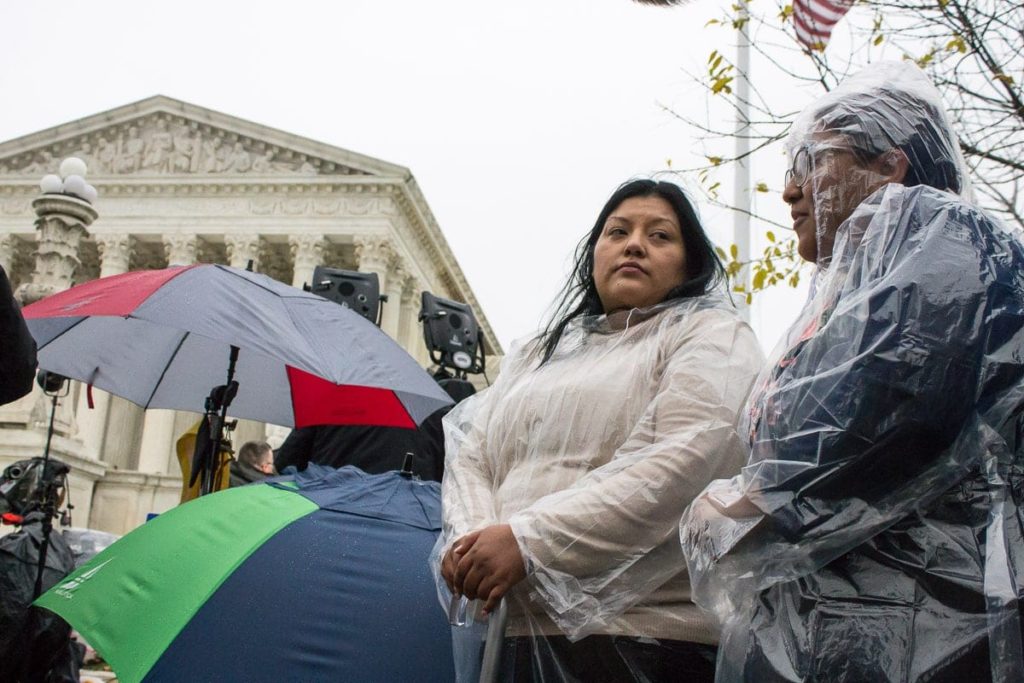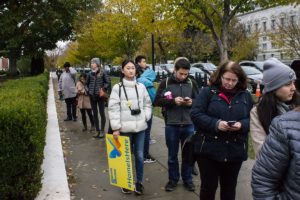WASHINGTON, D.C. — Supreme Court Justices on Tuesday heard oral arguments from lawyers on behalf of government and immigration advocates over the legality of President Donald Trump’s decision to rescind DACA, the Deferred Action for Child Arrivals program.
Members of the public who wanted to witness the highly-anticipated hearing started forming a line outside the Supreme Court on Sunday. One of those who camped outside the courthouse in temperatures that dipped into the low 40’s was Areli.


Areli, who did not provide her last name, is a DACA recipient living in Los Angeles, but says she’s lived in several cities across California. She and her friends camped out in line since Sunday morning with coats and sleeping bags to keep warm because Capitol police do not allow tents outside the Supreme Court.
On Tuesday morning, she was the 52nd member of the public allowed to sit in during oral arguments. A few minutes before going in, she was cold but determined to be in the room while attorneys argued over the fate of DACA — and her future.
“It’s our lives being decided,” she said. “Folks that are not in this situation speak about it in political terms but these are our lives on the line.”
Areli was one of the undocumented people who initially hesitated to apply for DACA, but did so once she saw others get work permits. Her DACA status has helped her entire family; she can drive, board planes and contribute more financially. Areli, like many DACA recipients, is the first person in her family to have gone to college.


Witnesses inside the high court said the nine justices remained attentive during more than 80 minutes of oral arguments. Three cases, Trump v. NAACP, McAleenan v. Vidal and the Department of Homeland Security v. Regents of the University of California were asked to present their cases. Justices Sonia Sotomayor and Ruth Bader Ginsburg asked the administration’s legal team about the consequences of rescinding DACA.
Justices Neil Gorsuch and Brett Kavanaugh focused on the president’s authority to end the executive action. One of the justices read aloud from several of the amicus briefs filed in support of maintaining DACA — more than 140 businesses around the country filed briefs with the court, in addition to more than 170 current and former lawmakers. The city of San Jose, Santa Clara County and the University of California joined forces in lawsuits against the president’s administration. Two UC students studying in the District of Columbia this semester through the UCDC program were among the dozens of demonstrators rallying in front of the Supreme Court on Tuesday.
Audio recordings of the oral arguments will be released Friday.
Mina Choe from San Francisco said she was motivated to join the rally because she fears what may happen to a friend who benefits from DACA protections.
“Everyone comes here based on that American dream. You don’t just get to pick and choose who that dream applies to,” said Choe. She later joined the line to enter the courthouse.
Alyssa Jacobsen from Lancaster hoped DACA would be reinstated, especially for the students in the UC system. “They’ve proven themselves, as if they had to in the first place,” she said.
Large crowd outside the Supreme Court chanting “si se puede” in 40 degree weather and rain. #DACA @SJSpotlight pic.twitter.com/wi4GAXDXA5
— Elizabeth Mendez (@izziemae) November 12, 2019
After the oral arguments, DACA recipients and immigration supporters walked down the steps of the Supreme Court holding hands — greeted by a roaring crowd of pro-immigrant protests. California Attorney General Xavier Becerra posed for pictures with some of them.
“We learn from a young age, there’s a right way and a wrong way to do things. The federal government tried to terminate the DACA program the wrong way,” he said in a brief press conference with reporters.
Without going into specifics, Becerra said he was very proud of the arguments that were made on behalf of DACA recipients.
As the battle waged in the nation’s capital, back in San Jose, Services, Immigrants Rights and Education Network (SIREN) led a walkout at Hillview Park. At least 100 people attended, including 18-year old Ari Zarate, a DACA recipient and student at Del Mar High School.
#SanJose students and community members are hosting a walkout at Hillside Park to support #DACA and #TPS recipients on the same day the Supreme Court hears oral arguments on the issue.@SJSpotlight pic.twitter.com/4QPI6lFabx
— Katie Lauer (@_katielauer) November 12, 2019


“Seeing these people here, that sense of family and community, I know that they’ll have my back no matter what happens,” said Zarate.
But while DACA was the main focus of the Supreme Court on Tuesday, activists in Washington and San Jose also pushed for Congress to enact a longterm solution.
“A temporary extension for a temporary program is not enough,” said Eli Campos, an immigrant who attended the San Jose protest. “This is why I want to ask our leaders in Congress for new, more robust immigration policies that permanently protect immigrants with TPS and DACA from the constant fear and uncertainty caused by inconsistent immigration policies.”
Campos, 30, received his TPS status in 2001, three years after moving to San Jose from El Salvador. He only knew how to say “no English” when he first started school as a 4th grader, but was speaking fluently by 6th grade. Now he dreams of opening his own business.
Activists point to HR 6, the American Dream and Promise Act, as a possible solution. The bill, which passed in the House in June, would create a pathway to citizenship for immigrants who arrived to the U.S. before the age of 18, as well as for those who are current or potential holders of temporary protected status (TPS).
There were no counter-protests related to the DACA hearing in Washington, D.C. or in San Jose.
Trump, however, tweeted that a “large proportion” of DACA recipients have been arrested, referring to a recent USCIS report that found 53,792 recipients were arrested prior to their most recent approval. That accounts for 8 percent of the total DACA requestors, and the vast majority — about 797,297 — had no arrests or apprehensions.
DACA recipients with arrest records: 53,792! That is a very large proportion of the total. @LouDobbs Not good, but we will be able to make a deal with the Dems!
— Donald J. Trump (@realDonaldTrump) November 13, 2019
In the meantime, immigration supporters in San Jose are hoping for win in the Supreme Court.
“Hopefully, God puts it in their hearts to decide on the right side of history. There’s too many people who depend on this program,” said Campos.
Contact Elizabeth Mendez at [email protected] or follow @izziemae on Twitter. Contact Katie Lauer at [email protected] or follow @_katielauer on Twitter.




Leave a Reply
You must be logged in to post a comment.